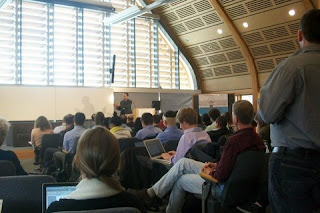 The U.S./Canada Citizens’ Summit for
The U.S./Canada Citizens’ Summit for  Sustainable Development held at Yale University School of Forestry Environmental Studies March 24-25, 2012 was organized by Yale students, faculty and staff, with the Citizens Network for Sustainable Development, We Canada, the Natural Resources Defense Council, SustainUS, and the Human Impact Institute. It aims to foster coherent, effective citizen advocacy for the UN Rio +20 conference.
Sustainable Development held at Yale University School of Forestry Environmental Studies March 24-25, 2012 was organized by Yale students, faculty and staff, with the Citizens Network for Sustainable Development, We Canada, the Natural Resources Defense Council, SustainUS, and the Human Impact Institute. It aims to foster coherent, effective citizen advocacy for the UN Rio +20 conference.The first day opened with a panel discussion “20 years after Rio–why are we not there yet?”
Dan Esty of Connecticut Department of Energy (former deputy head Rio 1992 US delegation) said the present lack of political will was due to 1. the absence of a firm scientific basis, clearly acknowledging uncertainty and trade-offs; 2. absence of policy choices that appeal to business e.g. Stephen Schmidthemy's energy efficiency; 3. politics of moral righteousness which are insufficient to gain wide support.

Jacob Scheer of NDRC lauded Rio 1992 for laying the foundations of Agenda 21, two treaties and forest commitments. 150 countries set up policy institutions, 86 established plans, thousands of cities joined in, corporations accepted the idea of a “triple bottom line”. 1992 was a climax of 1950s activism, with top-down, one-size-fits-all planning. This faded due to lack of leadership on emissions cuts and direct aid to poor countries. The public was not engaged we can learn from the last 20 years. There are no 1.2 billion more humans, 40 500 million emerging from poverty, coal use has doubled and climate change is now an immediate crisis–not one for the grandchildren. Other changes: we are crossing planetary boundaries, globalization has eroded state power e.g. Walmart has more income than 100 countries, Gates foundation is bigger than WHO; digital revolution has given us 6 billion cell users, 2 million on Internet, engaging people directly. Hopes to mobilize public opinion and generate commitments from the bottom up.
 | |
| Yale Forestry & Env. Studies Kroon Hall |
For J.L."Kimo" Goree of IISD's Environmental Negotiations Bulletin, Rio 2012 is no 1992. The enabling resolution would not be possible today. The 1992 deal was never fulfilled -- no technological transfer and no direct aid to poor countries; doomed by globalization (1994 WTO, emphasis on trade not aid) and the loss of the peace dividend; never-ending negotiations. See his new book The Road from Rio. The correct Zero Draft is a dog's breakfast, lacking ambition and vision, showing loss of enthusiasm for international agreements, and infighting between UN agencies. Unlike 1992, UN DESA is currently underfunded, understaffed and unable to do the necessary preparations. In 1992 there were 400 pages. In 2012 there are only 2 themes: the green economy and sustainable development. No binding commitments. Where is the “should”? Where are best practices? Where are the means of getting there? For instance at the recent Rio+2.0 conference at Stanford http://csi.gsb.stanford.edu/rio20-conference, entrepreneurs, corporations and practitioners enthusiastically discussed how IT could help.
 Esty: the US rejected the idea of reining in consumption and finance; Agenda 21 was part of the problem, lost focus with too many priorities, social priorities swamped sustainable development.
Esty: the US rejected the idea of reining in consumption and finance; Agenda 21 was part of the problem, lost focus with too many priorities, social priorities swamped sustainable development.Scheer: civil society can provide the lost vision, focus on action plans and accountability. If each country and each corporation said here's what I'm doing, here's where I need help. We have to escape from the situation where everybody is promising and no one is responsible. We hope for a social media wave starting on Earth Day 2012.
Goree: IEAWG commitments were made in 2009. I support a call for commitments so we can monitor compliance. There were at Rio 1992 specific promises to reaffirm 0.7% GNP for direct aid -- rich countries failed. Weasel words. The US omitted itself in this text because it had never "affirmed" this level of aid.
Esty: Degrowth and reducing consumption will fail in the USA. Those values are too alien. We need to harness the market, create incentive structures.
 | |
| Gail Karlsson and Michael Dorsey |
Afternoon plenaries:
The UNGA High-level Panel on Global Sustainability was discussed by Prof. Ben Cashore of Yale, Georgios Kostakos of the GS panel, and Jim Balsillie of RIM/BlackBerry, who called it a new paradigm for growth, choice and resilience. He challenged us to use social media to construct visions, and to avoid righteousness and top-down solutions
John Matuszak of the US State Department said it will not treat Rio +20 as an environmental negotiation but operate under presidential order 1000 (??) ; it will challenge civil society to create voluntary commitments, partnerships with business, and find an integrating principle. The Zero Draft is a voluntary document, trying to be all things to all people. Everybody is committed to everything, but there is no responsibility for anyone. Civil society can use social media to hold parties to their commitments. Rio can reset the UN process to focus on development as well as the environment, involving all parts of society [especially business]. The US wants to scale back the Zero Draft, cutting it down to a short document that identifies a few goals. Could be accompanied by an Internet "compendium of commitments" with civil society acting as watchdogs, and web-based geospatial data.
Prof Ben Cathore noted the launching of GEM: Government, Environment and Markets initiative at Yale.
 |
| Dianne Dillon-Ridgley |

No comments:
Post a Comment